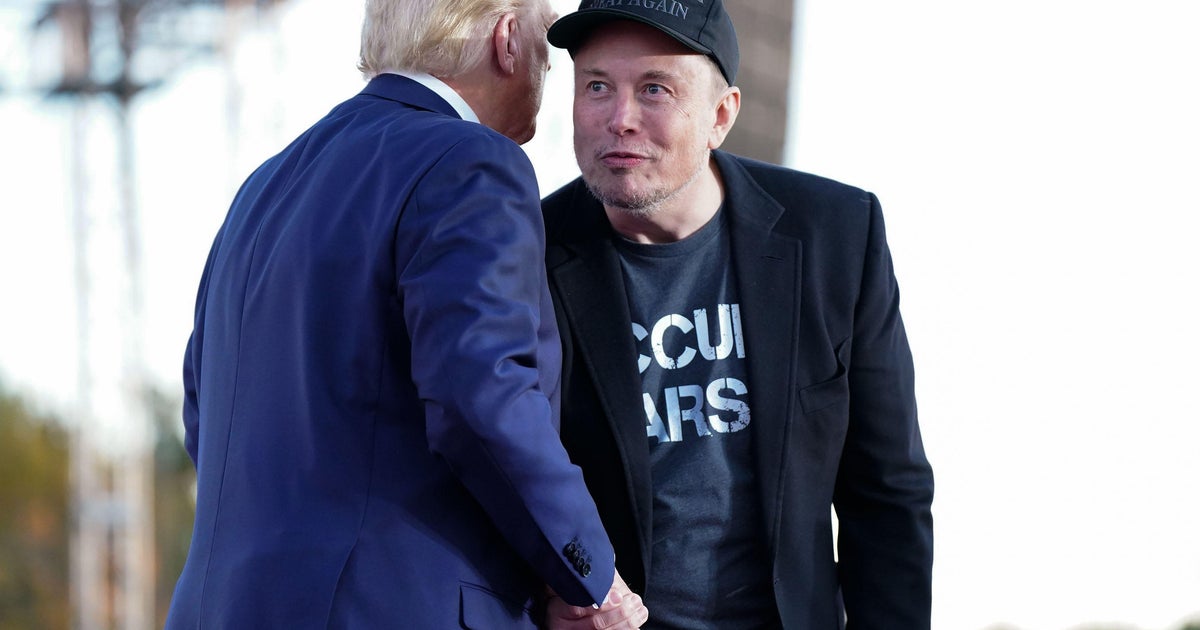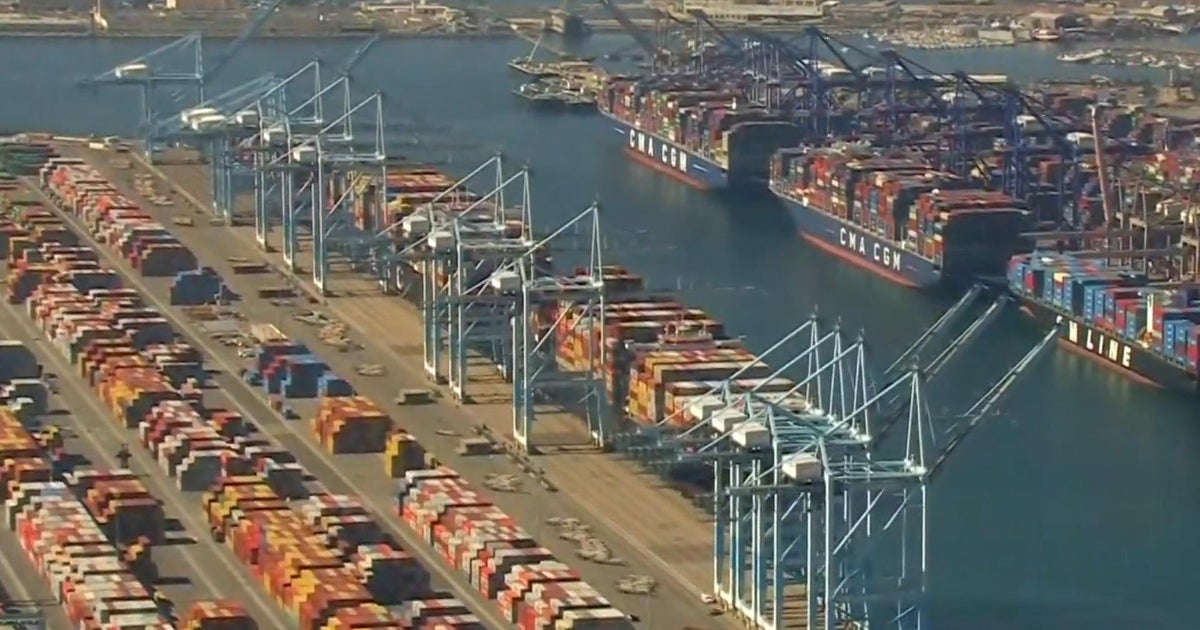CBS News
Trump’s win could sharply raise the cost of electric vehicles. Here’s why.

With President-elect Donald Trump vowing to pull the plug on the $7,500 tax credit for buyers of electric vehicles, one EV maker and its billionaire owner are fully behind the idea and even stand to profit from it.
“Take away the subsidies, it will only help Tesla,” Tesla owner Elon Musk posted in July on X, the social media platform he owns.
The credit granted to buyers of EVs helped make the case for buying the climate-friendlier vehicles, and when an earlier version of the tax credit was done away with several years ago, Tesla cut prices on its cars by about half of the credit its buyers were no longer receiving.
Tesla is the sole automaker to be generating a profit on its U.S. sales. Manufacturing EVs is a losing proposition for Big Three vehicle makers like Ford and General Motors, who sell a fraction of EVs compared with Tesla.
Once the EV tax credit is vanquished, the price of EVs overall might drop, cutting into Tesla’s profits, as opposed to increasing the company’s red ink as it could for legacy automakers still working to get a firmer footing in the EV market. Should traditional automakers scale back on their EV production and sales to curtail the losses, EV shoppers would have even fewer options, benefiting Tesla.
As Musk touted his support for axing the EV tax credit, Tesla’s auto industry rivals signaled the opposite.
The Alliance for Automotive Innovation urged that the tax credit continue, telling lawmakers in an October letter that U.S. manufacturers count on it as they vie with Chinese EV production. Around the world, vehicle makers have poured billions into transitioning to electric cars.
Further, the Zero Emission Transportation Association on Friday called on Trump to reconsider, saying the tax credit has bolstered employment in states that voted Republican, including Ohio, Kentucky, Michigan and Georgia.
“If the United States is going to continue to fight to bring those jobs here and actually compete to win against China, there needs to be a demand signal — like the New Clean Vehicle Tax Credit — aligned with that goal, otherwise we would be undercutting those investments and hurting American job growth,” ZETA Executive Director Albert Gore stated on Friday.
“The potential elimination of the federal tax credit for electric vehicles by the Trump administration — without another form of incentive to replace it — could derail the trajectory of EV sales in the United States,” offered Edmunds analysts.
Trump repeatedly vowed to eliminate what he labeled President Joe Biden’s “EV mandate” as he campaigned for the White House.
While there is no such mandate in federal law, the Inflation Reduction Act passed during President Biden’s term revived the credit for many EV purchases, while also granting low interest loans to manufacturers constructing EV and battery plants.
Trump’s transition team intends to knock out the credit as part of a broader tax-reform measure, according to a Thursday report by Reuters, which cited two sources with direct knowledge of the matter.
The president-elect during his first term attempted to repeal the EV tax credit, which was expanded by President Biden in 2022.
Analysts who track Tesla concurred with Musk’s view that the credit’s demise would only help his company.
“This is a clear negative for the EV industry at first look and would particularly hurt GM, Ford, Stellantis and Rivian,” wrote Wedbush Securities tech analyst Daniel Ives. Conversely, “this will enable Tesla to further fend off competition from Detroit as pricing/scale/scope is an apples-to-oranges when compared to the rest of the auto industry once the EV tax credit disappears.”
Americans looking to buy an electric car should do so sooner rather than later, advised Ivan Drury, Edmunds’ director Insights.
“The federal tax credit combined with slashed prices due to slowed sales momentum has contributed to electric vehicles becoming labeled as some of the best deals on the market in 2024. Now, with production cuts shrinking supply and a fresh wave of demand from those seeking a deal while they still can, it can be all but assured that the price for that EV you’ve been eyeing is going up in the coming months,” Drury stated.
CBS News
Son surprises dad with Camaro decades after he gave one up to start a family

Watch CBS News
Be the first to know
Get browser notifications for breaking news, live events, and exclusive reporting.
CBS News
Why Trump’s tariff proposals have some business owners worried

Los Angeles — Bobby Djavaheri is trying to stock up his warehouse with appliances from overseas, while he can still afford it.
“We’ve been preparing for the last six months — both our factories and us as importers — for Trump to win,” Djavaheri told CBS News.
Djavaheri is president of Los Angeles-based Yedi Houseware Appliances, which manufactures its products in China. He says President-elect Donald Trump’s threat to increase tariffs will force him to charge more.
His company’s Yedi Evolution air fryer is currently priced at $130, Djavaheri said. He estimates that Trump’s proposed tariffs would raise that price to about $200. Yedi’s two-quart air fryer currently costs between $30 and $40. Trump’s tariffs could raise that to almost $100.
Trump campaigned on implementing a blanket tariff of 10% to 20% on all imports, along with an additional 60% or more on goods from China.
“It would decimate our business, but not only our business,” Djavaheri said. “It would decimate all small businesses that rely on importing.”
Djavaheri says it is not Chinese companies that pay the tariffs, it is his own business.
“We’re getting the bill, the bill comes straight to us from the government,” Djavaheri said.
Brian Peck, adjunct assistant professor of international trade law at USC, says Trump’s tariffs could also be a negotiating tactic.
“If he doesn’t like a certain practice or policy initiative, he can use it as leverage to threaten them,” Peck said. “…It’s important for the American people to understand that the people who pay tariffs are U.S. importers. Not China, not foreign governments, not foreign companies. That’s going to come down to your wallet.”
An August study by the Peterson Institute for International Economics indicated that Trump’s proposed tariffs could cost middle-income households more than $2,600 a year.
In 2018, when Trump slapped tariffs on imported washing machines, prices jumped almost $100. But foreign appliance makers also moved some production to the U.S., and a year later they had created 1,800 new jobs.
Other countries, however, retaliated with tariffs on U.S. exports, which led to job losses.
According to Djavaheri, most of Yedi’s products cannot at the moment be manufactured in the U.S.
“There’s no factory in America,” Djavaheri said. “A factory that could potentially produce hundreds of thousands of air fryers in one year, same quality, there’s no where in the world other than the Chinese.”
Djavaheri’s advice? If you’re considering a purchase, make it before the potential tariffs kick in.
CBS News
Businesses brace for Trump’s proposed tariff hikes

Watch CBS News
Be the first to know
Get browser notifications for breaking news, live events, and exclusive reporting.



